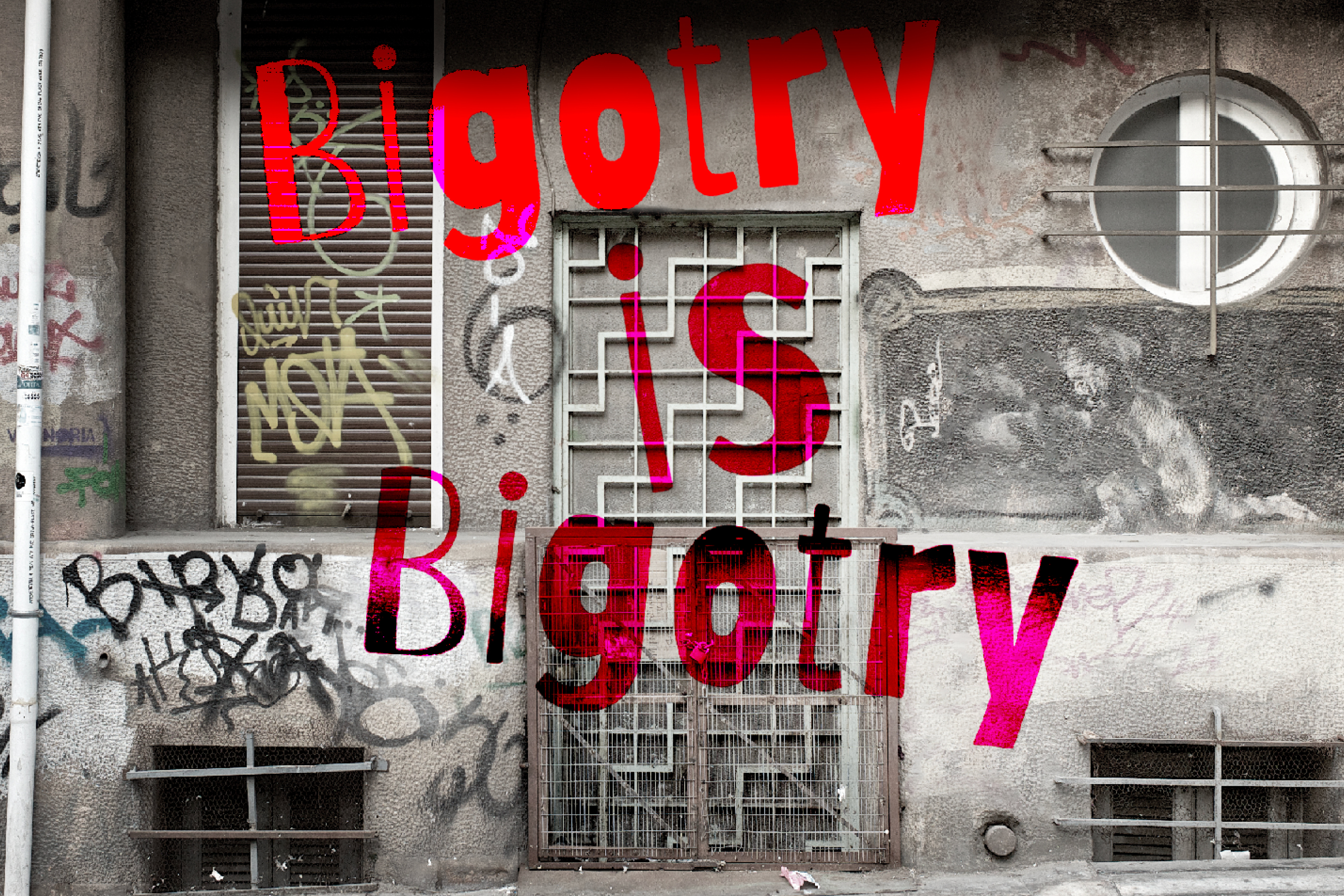
-
HOME
-
WHAT IS STANDOur Mission Our Values Our Help Contact
-
WHAT WE FIGHT FORReligious Freedom Religious Literacy Equality & Human Rights Inclusion & Respect Free Speech Responsible Journalism Corporate Accountability
-
RESOURCESExpert Studies Landmark Decisions White Papers FAQs David Miscavige Religious Freedom Resource Center Freedom of Religion & Human Rights Topic Index Priest-Penitent Privilege Islamophobia
-
HATE MONITORBiased Media Propagandists Hatemongers False Experts Hate Monitor Blog
-
NEWSROOMNews Media Watch Videos Blog
-
TAKE ACTIONCombat Hate & Discrimination Champion Freedom of Religion Demand Accountability
From Bathroom Hate Scrawl to Clickbait Column Inches, Bigotry Is Bigotry
“As a member of the controversial Church of Scientology, do you ever…” the interviewer began. I was alone in a hotel room in 1985, taking the phone call, which was broadcast live over the Portland airwaves. The purpose of the interview (I was told) was to get the whys and wherefores of our Church’s presence at a religious freedom rally downtown.
But the reporter was more interested in controversy.

Controversy! Drama! Conflict! Emotion! THAT’S the stuff of headlines! That’s what SELLS! Not something dull and joyous, like thousands of people gathering together in the name of fundamental human rights.
Well, at least he’s not a bigot, I thought, as I endeavored to steer him back to the subject we were supposed to be covering. How could he be? He was a well-known journalist, not a drooling skinhead. And though I couldn’t see him through the phone receiver, I was sure that he wasn’t wearing a white hood or covered with swastika facial tattoos.
Hey, what did I know? I was young and naïve.
These are the bigots who often delegate their dirty work to other bigots. They promote them, platform them, sometimes even publish them, and quite frequently pay them.
Thirty years later. Different phone call, different reporter, same word: “controversial.”
In the ensuing generation-plus, I had learned my lesson: of course, he’s a bigot. Just a specific brand.
There are the bigots who march and scream, “Jews will not replace us!” These intimidate, they mutilate property, they embrace violence and are stupid with hate.
Then there are the other bigots. These bigots have—many of them—gone to distinguished universities. They have grammar and punctuation skills and a vocabulary that includes words of two syllables and more. They are soft-spoken, some of them, and like to think of themselves as witty. These are the bigots like those who “interviewed” me.
These are the bigots who often delegate their dirty work to other bigots. They promote them, platform them, sometimes even publish them, and quite frequently pay them. Or they just write the nasty piece themselves, get the cash, and then skulk back into the shadows.
Exhibit A: The New York Post published a story in December whose author was appalled that a successful and well-known actress has somehow, “despite” her religion, managed to be successful and well-known. This is obviously Part One of a series wherein the reporter will spotlight others who have—despite their religion—become successful. People like, say, Bing Crosby, Jimmy Carter, Bono and Martin Luther King Jr.
The New York Post reporter is an example of a literate bigot using her daily rag as a platform for her hate. (Wow, feel the controversy!)
Exhibit B: The Daily Beast. Here the bigot hires a bigot—in this case, rookie editor-in-chief Tracy Connor whistled up serial frother and child sex trafficking apologist Tony Ortega to hatchet out canard-crammed column inches on the Church of Scientology. Ortega’s résumé of manufacturing news stories out of whole cloth and then protecting himself with phony bylines must have impressed Ms. Connor. That and his slavering subservience to the since-convicted executives of what was once the largest online sex trafficking site in the world doubtless proved irresistible to her. (Seedy clickbait-on-demand! Perfect!)
In both these cases, the bigots—be they articulate or slobbering—like slugs leave a mucusy trail that slimes their platforms.
So buyer beware! No matter if the hate is scrawled on a bathroom stall or printed in clickbait inches, bigotry is bigotry.
The current antics of the tabloid New York Post—founded by Alexander Hamilton shortly before he was shot in a duel—would cause that founding father to do a double take from his grave at how far from the freedom of religion, for which he fought so hard, it has sunk.
“We shine a bright light on the people and institutions that shape our readers’ lives,” the Post brags on its website. Um… no you don’t.
The Daily Beast, for its part, prides itself on its “fact-informed analysis.” That phrase—“fact-informed analysis”—in this context means Ms. Connor was fully informed of the facts of Ortega’s arsenal of arsenic-laced mendacities, duly analyzed them and found him a worthy mouthpiece for concocted controversy.
So buyer beware! No matter if the hate is scrawled on a bathroom stall or printed in clickbait inches, bigotry is bigotry.
The word “bigot,” it is instructive to note, came into existence just under a thousand years ago. The French—irritated by the invading Normans’ habit of continually screaming bi God! (Old English for “by God!”) at every little thing—took to derisively calling the perpetually upset-over-nothing newcomers bigots.
The French got it right. A bigot is someone who is continually fighting invisible battles with someone or some group someplace. Their outrage makes no logical sense, but they’re obviously really, really, really upset, so, bi God, maybe I should be also?
No, you shouldn’t.
But you should recognize bigotry when you see it.
Just like I didn’t in that radio interview so long ago.
But now I do, and I no longer put up with it. You shouldn’t either.
Life is too short and too beautiful.









